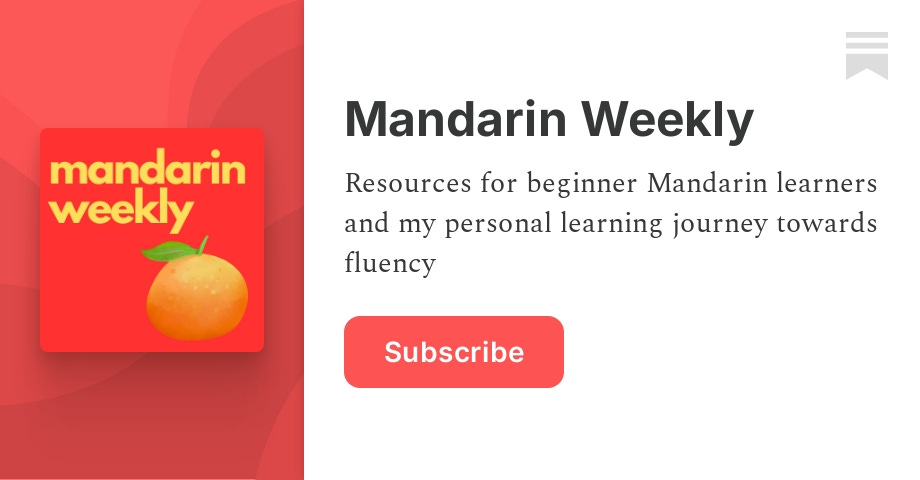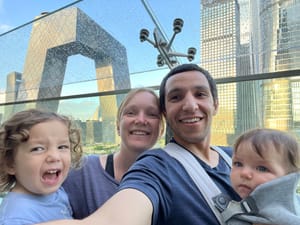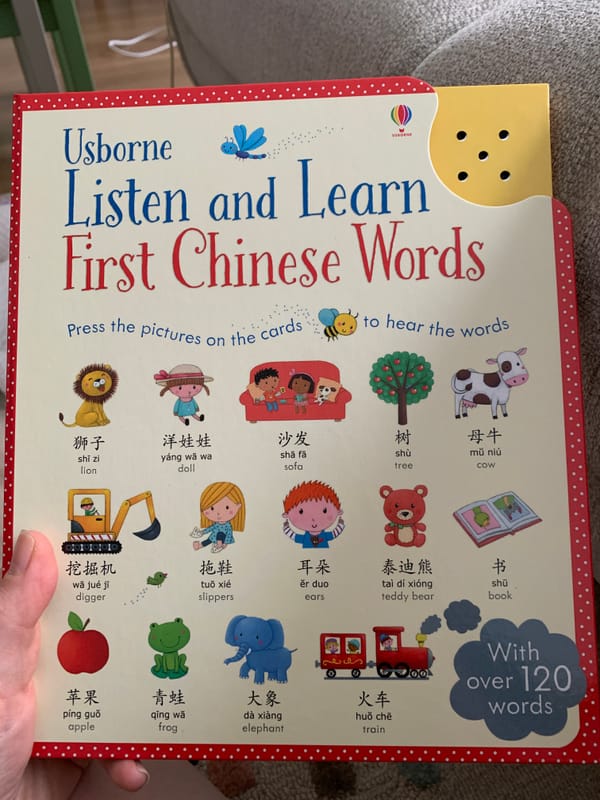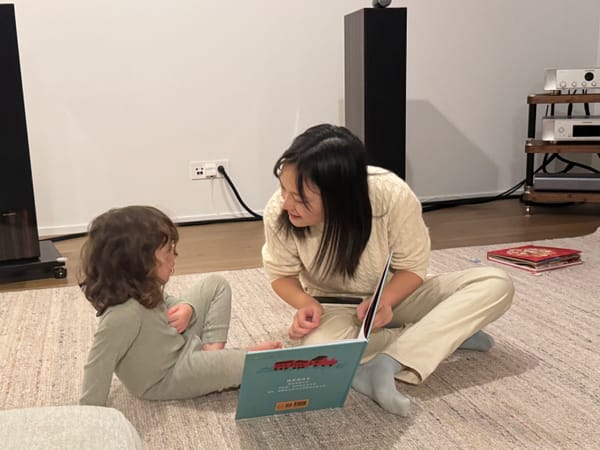Introduction
Less than a year ago I have embarked on a journey of learning Mandarin Chinese. I started out just attending a course on a weekly basis in the local Mandarin school, but the more I was learning, I became more engaged and now I am really motivated to achieve basic proficiency in the language to be able to get more out of our next trip to China.
In this blog post I will explore my experience so far - why I started learning, how I am studying, what tools I am using and what progress I have made so far.
If you are interested in following up more closely on the topic, I have also started a Substack channel where I am practicing writing in Mandarin and compiling a sort-of weekly beginner's study resources newsletter:

How and why did I start learning Chinese?
I have never thought about learning Mandarin. Until we signed our daughter up for Mandarin playschool and visiting China with family for the first time this was never my dream or my goal - surprising, since I am a keen language learner. Being a native Polish speaker, I am fluent English and German, achieved B2 level in French (although I wouldn't go as far as to say I speak it at that level anymore), I have basic understanding of Swedish, Spanish and Russian. But I have never thought about learning a non-European language. Perhaps because when I was living still in Poland, travelling outside of Europe was such a remote idea that I didn't see any need for learning Chinese, Arabic or any other language that is widely spoken outside of the West.
It was only after visiting an amazing bookstore in Chengdu called Fangsuo Commune. Flipping threw countless books that I could not understand a word from and looking at beautiful caligraphy practice paper I realised that here I am, surrounded literally by millions of pages worth of knowledge, philosophy and culture, completely clueless. The language spoken by more than a billion people in the fastest growing economy in the world, in the country demonised in the Western press, and I have no idea what people are ACTUALLY thinking, saying, writing about.
This was the moment when I thought to myself how amazing it would be to get at least basic understanding of the language and maybe next time we go to China (by then we knew it would not be the last time), I would be able to ask people where they live, what they do, what they think.
Almost immediately I started looking for a language school in Zurich where I live, and found one that was a walking distance from my home - Sprachschule Yang - and I signed up for a beginner's course.
How did it feel at the very beginning?
The first lesson of the course took place when I was still in China, so showing up the first time I already felt lost - we were practicing tones and I had no idea what I was hearing. I couldn't really hear the differences in tones and the more I tried to get it right, the more mistakes I was making! And everyone else seemed so proficient! After one lesson they had 100% more experience than me I guess...
This feeling of getting lost didn't go away for a while. Even though with time it was getting easier, I started to recognise some characters and understand some basic dialogs, but the progress was very slow. In fact, after a while, I had a feeling I am not able to keep up the pace - it was taking me more and more time to do the homework, and I couldn't remember the new vocabulary. I guess starting such a big commitment as language learning when you have a toddler and a baby at home is not ideal...
But I was really determined so the last month I really commited myself to studying regularly and it has made a huge difference - lessons are much more enjoyable when you see yourself improving.
How do I study?
I am still experimenting with finding the best way to study that works for me. There is a bunch of different things I do:
- following the course book, doing my homework and trying to learn vocabulary from the book. I see this as the guideline of what to learn at my current level and the main motivation to keep going. We are in the third part of the A1 course and the people in the course who have made it so far are all very motivated, which helps me stay motivated myself.
- going to Mandarin baby singing class with my daughters - it is something I am doing for them mainly, but this immersive experience is helping me a lot too! The songs help me learn basic things like colours, morning routine, body parts etc. The fact that the teacher speaks only Chinese to kids helps me to try to use the basics of my Mandarin to work out what is happening from the contex
- To practice active use of the language, I write daily on Substack - I write just a few sentences about my day, trying to use as much vocabulary and grammatical structures I know as possible. I write down the vocabulary I needed but couldn't remember - this helps me learn exactly what I would need if I wanted to tell somebody what I want to say
- To practice understanding, I started using Pimsleur app, which is primary listening-based app with lessons 30 minutes long each. So far I really enjoy it although I find it hard to focus for 30 minutes.
- To memorise vocabulary I use Anki app - it allows me to practice with ready made decks that cover HSK1 and HSK2 vocabulary or make my own flashcards. The cool things about Anki is that it spaces out repetitions so that you practice vocabulary at the frequency you need.
- on top of that I use Duolingo, Chineasy (to memorise Characters) and sometimes listen to Chinese learner's podcasts (like ChinesePod) but I don't do any of those things regularly at this point.
At this time I spend around 1-1.5h daily learning Chinese - and I find this amount of time a sweet spot to be enough to see progress and not too much to burn out too quickly. The only thing that I still find missing from my studies is conversation classes - I might add some later this year.
With this level of commitment it seems I am on track to be able to take the HSK2 exam sometime later this year.
What is my motivation to study?
As I already mentioned at the beginning, I would love to be able to understand what Chinese people are actually thinking and saying, understand the culture more, as it seems to me it is so different to the West! We also intend to travel more and more to China, so knowing basic Chinese opens more doors and would make more off-the-beaten-path experiences possible.
Another reason why I am very motivated is that we signed up our daughter for Chinese playgroup and it gives her extra motivation when she sees mommy is also learning!


Is it difficult to learn Chinese as an adult?
It is, definitely. Learning any language as an adult is difficult, especially that unlike for kids, there is nobody who would speak to us slowly, with simple words, about simple topics on daily basis. We need to figure out ourselves what works and what doesn't and I find this being the hardest part. Which is why I started documenting online my own journey to see what works and to give other people resources so that they can dive into the right routine quicker than I did.
On the other hand, it isn't as hard as I thought it would be! After 9 months of studying it doesn't feel impossible anymore that one day, if I put those hours of study in, I will be ably to actually communicate. Chinese is difficult primarily because is so different from all European languages, that there is no way to "cheat your way" into converstation - you really need to know the vocabulary to be understood. However the basic grammar is not that complex - so that is a big plus.
Final thoughts
I hope this article will inspire you to take on Mandarin and believe it is not impossible to start learning it, even as an adult. For me the idea of the reward waiting on the other side and the immense challenge is a great motivation. And I hope that in few years I will be able to write an article about how I was able to become proficient in Chinese - but that is still hundreds if not thousands hours of study away!












Member discussion